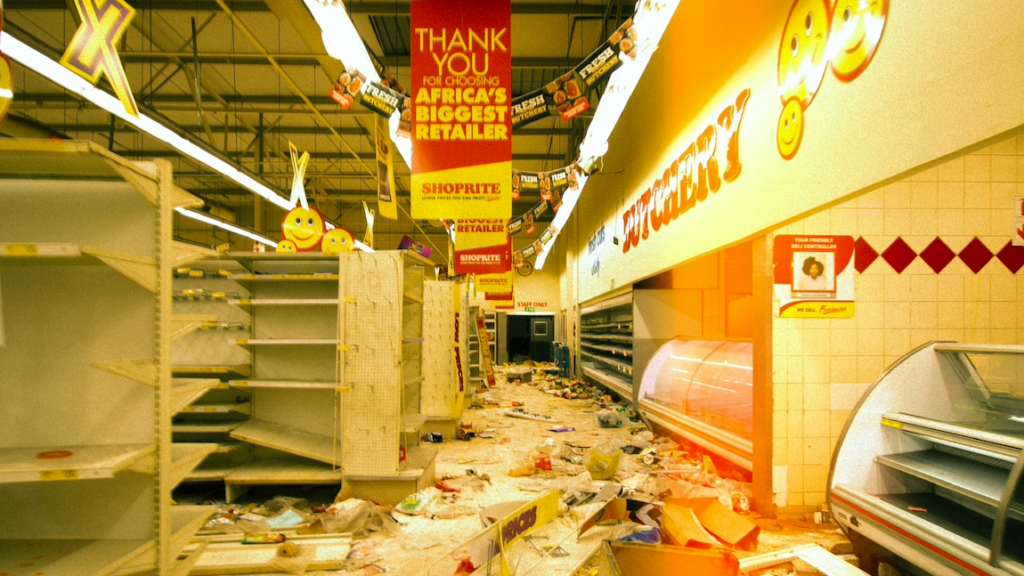Originally captioned ‘Aftermath’, Ntate Phakela’s photo series is chilling. What leads me to use this choice of words is as follows, writes Cape {town} Etc’s Ashleigh Nefdt. The somber stills look like something out of a history book, that sends shivers down one’s spine even if we were imagining the past. But to realise that this is the current climate in South Africa? Now that is what sends shivers down the spine of reality.
The eyes behind the lens are those of Ntate Phakela, also known by his Instagram name, 7venth. He is a 22-year-old photographer and film student who managed to capture the chaos, putting into visuals what many South Africans are feeling right now: a loss for words. When going through the images and speaking to Phakela, the situation of civil unrest that South Africa is currently facing is seen more personally. Although the mall captured in one shot may not be a local spot for many of us, Phakela’s work and words encompass things in such a way that we feel as though we’ve known it all our lives.
The series was shot with permission from the police and depicts the looted Naledi Mall and Goldspot in Vorloorus, Ekhuruleni, Gauteng on July 11. The visuals capture a portion of the aftermath of the civil unrest in South Africa, which intensified in the form of protesting, looting and riots in KwaZulu-Natal and Gauteng following the arrest of former President Jacob Zuma.


The juxtaposed yellow smiley faces and ‘Thank You’ signs that smile at us amongst the aftermath of the lootings present an eery visual. The photographs are raw and yet look like something out of an apocalyptic film. Reality is hard to conceptualise right now.



Phakela’s photos arguably send an even stronger message of heartache and there is something to be said on the after effect, especially when it would later be inferred that it was only the beginning.


Of his work, Phakela has expressed to me that he is focused on “finding what contemporary Africa looks like.” He notes that ‘Africa at times, is an individual experience,” and he tries to capture the Africa he has been exposed to in all of his work, throughout all mediums. However, only two days ago, this was the reality.


On Phakela’s experience capturing these images.
“I’m not a trained photojournalist, so navigating the environment was all new to me,” says Phakela.
“After taking a couple of photographs, my mood changed from being hopeful and excited about the possible photos i could take to being saddened to the point of tears. It was a surreal experience. I just couldn’t believe that this was the state of my hometown.”
“I had to take a break between some photographs and say a little prayer for South Africa.”
On being asked how he felt behind the lens, Phakela explains the process of how he had to let go.
“What I was looking at, through the lens and through my eyes, was a South Africa I didn’t want to see. At this point, I kind of let go… I just pressed the shutter.”
“I was no longer being artistic or clever with my shots.. I just wanted to show people what the infrastructure in my hometown looks like now, in its bare form,” he says.
Release of the emotions.
When he got home, he started writing as a method to release what he was feeling inside. I thought it was too powerful and raw not be included in a piece as honest as this.
“I hoped I wouldn’t write of my experiences from today but the surreal reality I so overwhelmingly woke up to today strips me of that desire. I could hear my journal ask me to stop writing today. The ardour of my words were too heavy for the pages. I tried to remember what the burnt buildings and ravaged shop fronts looked like before this moment. I can’t. It is as if the beautiful images I had of my community had been put in a box and thrown in the fire that consumed these buildings. My mind is frivolously trying to find solutions for all this. Implementable solutions for when the dust settles. Unfortunately, my mind is crippled by questions that are so simple in stature yet so complex in nature. Where to next?”
Indeed South Africa, where to next.
More of Phakela’s work can be found on his Instagram page, where he hopes to pay homage to African creatives and artists who came before, and can be found here: @7venth
With regards to what he wants to achieve with his work, Phakela expresses that: “I want to play my part in creating a creative library and a creative wealth that our future Africans can draw and build from.”
No doubt future Africans and the world will remember your work, especially this series, for years to come.
All Pictures: Ntate Phakela/ @7venth

